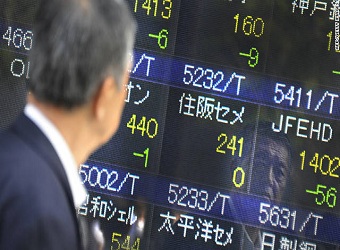Asian markets traded lower on Monday, with Sterling tumbling about 0.4 percent to the dollar, while companies continued to report quarterly earnings at February nearly draws to a close.
Sterling was last quoted down 0.42 percent against the dollar in early Asia trade, with the pound/dollar pair trading at $1.2413 at 10:27 a.m. HK/SIN, dropping from levels above $1.2500 in the previous session. Earlier, the pound fell a bit over 0.50 percent.
Experts pointed to a report from the Times of London that suggested Prime Minister Theresa May was preparing for the Scottish government to call a second independence referendum to coincide with the triggering of Article 50 in March.
“If that’s the case, I suspect there’s been a bit of an overreaction here,” Ray Attrill, global co-head of foreign exchange strategy at the National Australia Bank, told CNBC.
Attrill added, “If the market does seriously think there can be another independence referendum much sooner than that, then remembering how hard the pound fell in early September 2014 just in front of the prior referendum, then the memory of that makes Sterling a fairly easy sell here.”
Meanwhile, Stephen Innes, a senior trader at OANDA, told CNBC the pound’s decline could have been a result of traders hedging bets that U.K. economic data will likely be on the soft side in the future and also due to the lingering uncertainty over Brexit negotiations.
“It’s not as if we did not see it coming,” Innes said, adding: “I do see decent support coming in at 1.2410-25 level but the big play for the dollar remains Trump’s speech tomorrow night.”
U.S. President Donald Trump will address a joint session of Congress on Tuesday night.
Japan’s Nikkei 225 was down 1.16 percent, with exporters likely under pressure from a relatively stronger yen, which traded at 112.12 to the dollar at 10:36 a.m. HK/SIN, strengthening from levels above 112.80 last week. Earlier, the yen hit a session high of 111.89 against the greenback.
Major exporters were mostly lower, with Toyota down 0.78 percent, Honda down 1.66 percent and Sony off by 0.98 percent.
Shares of troubled Japanese airbag maker Takata beat the generally downward trend to climb 0.37 percent, after a Wall Street Journal report that it is on the verge of hiring attorney Kenneth Feinberg to sort through claims for its $125 million compensation fund for victims of faulty air bags.
Feinberg ran a similar program for GM and oversaw compensation funds for victims of the Sept. 11, 2001, terrorist attacks and BP’s Deepwater Horizon oil spill in 2010, the Journal reported.
Last month, Takata agreed to plead guilty to wire fraud and pay a total of $1 billion in criminal penalties stemming from its fraudulent conduct in relation to sales of defective airbag inflators.
It also announced it will establish two restitution funds; a $125 million fund for individuals physically injured by the faulty airbags who have yet to reach a settlement with Takata, as well as a $850 million fund to shoulder the airbag recall and replacement costs incurred by affected auto manufacturers.
Elsewhere, SoftBank shares fell 2.35 percent, despite news the internet and telecom giant is close to finalizing an investment in WeWork. A source told CNBC the deal is expected to be worth over $3 billion.
In South Korea, the Kospi traded down 0.20 percent. Australia’s benchmark ASX 200 traded down 0.12 percent. Hong Kong’s Hang Seng index climbed 0.28 percent, while Chinese mainland shares traded mixed. The Shanghai composite was down 0.2 percent, while the Shenzhen composite added 0.05 percent.
“Market positioning over the last week has been to cut back on Trump’s trades,” said Weiling Chang, a currency strategy at Mizuho Bank, adding traders were beginning to doubt whether Trump will carry out his promise on infrastructure investment and the timely implementation of his tax reforms.
“Given the diminished expectations, we are hopeful that Trump, with the help of his speechwriters, could imbue optimism back into markets over his proposed tax reforms in his speech to Congress,” Chang said in a note.
Samsung Electronics, the flagship brand of Samsung Group, was down 0.52 percent Monday morning, as South Korea’s largest conglomerate seeks to overcome its involvement in an influence peddling scandal, while also recovering from last year’s exploding Galaxy Note 7 fiasco.
On Sunday, Samsung announced its next flagship smartphone, the Galaxy S8, will be unveiled on March 29.
Meanwhile, the dollar index traded at 101.14 at 10:58 a.m. HK/SIN. Among other currency majors, the Australian dollar fetched $0.7685.
Source: CNBC
